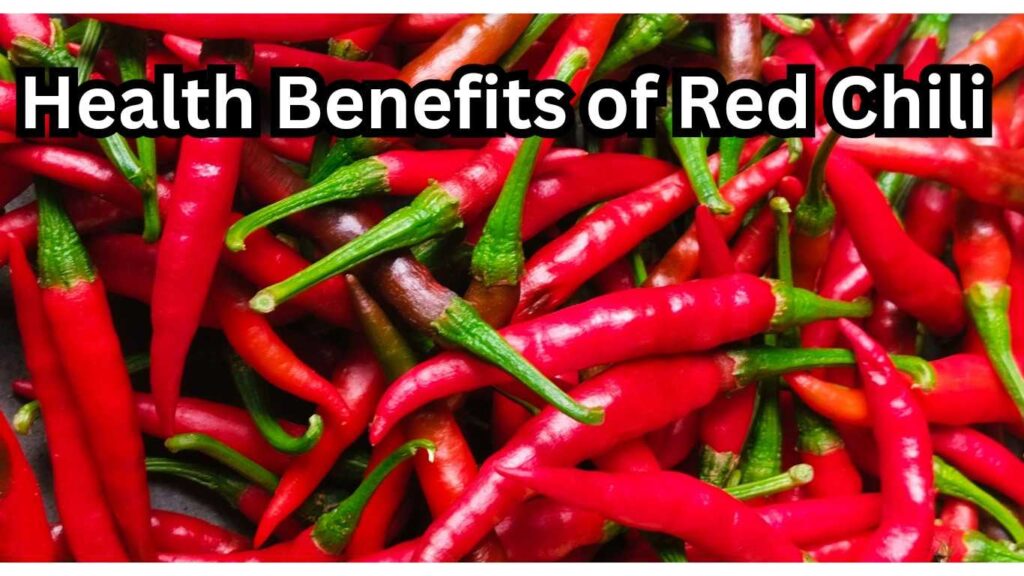Discover the Incredible Health Benefits of Red Chili Peppers
Red chili peppers, known for their vibrant color and spicy flavor, are more than just a popular ingredient in many cuisines around the world. They are packed with essential nutrients and offer numerous health benefits. In this comprehensive guide, we will explore the nutritional value, health benefits, and culinary uses of red chili peppers, as well as green chili leaves and chili powder.
Nutritional Value of Red Chili Peppers
Red chili peppers are low in calories but rich in vitamins and minerals. Here’s a breakdown of the key nutrients found in red chili peppers:
- Vitamin C: Red chili peppers are an excellent source of vitamin C, which is vital for immune function, skin health, and antioxidant protection.
- Vitamin A: They are high in vitamin A, which is essential for vision, immune function, and skin health.
- Capsaicin: The compound responsible for the spiciness of chili peppers, capsaicin, has been studied for its health benefits, including pain relief and metabolism enhancement.
- B Vitamins: Red chili peppers contain several B vitamins, including B6, which plays a role in energy metabolism and brain health.
- Minerals: They provide minerals like potassium, magnesium, and iron, which are important for various bodily functions.
Health Benefits of Red Chili Peppers
Red chili peppers, often found in various cuisines worldwide, are more than just a spicy addition to your meals. They offer a plethora of health benefits due to their rich nutritional profile and the presence of bioactive compounds like capsaicin. Let’s delve deeper into the numerous health benefits of red chili peppers.
1. Rich in Nutrients
Red chili peppers are packed with essential nutrients that contribute to overall health and well-being.
- Vitamin A: This vitamin plays a crucial role in maintaining good vision, supporting immune function, and promoting healthy skin. A single serving of red chili peppers provides a significant amount of your daily vitamin A requirement, which is vital for cellular growth and repair.
- Vitamin C: Known for its immune-boosting properties, vitamin C helps the body combat infections and promotes healthy skin. It also plays a role in collagen synthesis, essential for skin elasticity and wound healing. The antioxidant properties of vitamin C further help reduce inflammation and the risk of chronic diseases.
- B Vitamins: Red chili peppers contain various B vitamins, including B6 and folate, which are important for energy metabolism, brain function, and the production of red blood cells. These vitamins help the body convert food into energy and support overall cognitive health.
2. High in Antioxidants
Antioxidants are crucial for protecting the body against oxidative stress, which can lead to chronic diseases. Red chili peppers are a rich source of several antioxidants.
- Carotenoids: These compounds give red chili peppers their vibrant color and are linked to improved heart health. Carotenoids help reduce inflammation and may lower the risk of developing cardiovascular diseases by improving vascular function.
- Flavonoids: These antioxidants help protect the body from free radical damage, reducing inflammation and the risk of chronic diseases. They also contribute to the overall health of the cardiovascular system.
3. Capsaicin Benefits
Capsaicin is the active compound responsible for the heat of chili peppers, and it has numerous health benefits.
- Pain Relief: Capsaicin is known for its analgesic properties and is often used in topical creams to relieve pain associated with arthritis, muscle soreness, and nerve damage. It works by desensitizing nerve receptors, providing temporary pain relief.
- Weight Management: Capsaicin may help in weight loss by reducing hunger and increasing metabolic rate. Some studies suggest that it can enhance fat oxidation and energy expenditure, making it a beneficial addition to a weight loss regimen.
4. Heart Health
Incorporating red chili peppers into your diet can positively affect heart health.
- Cholesterol Reduction: Regular consumption of red chili peppers has been associated with lower levels of LDL cholesterol (the “bad” cholesterol) and triglycerides, while simultaneously raising HDL cholesterol (the “good” cholesterol). This balance is crucial for maintaining a healthy cardiovascular system.
- Blood Pressure Regulation: Capsaicin has vasodilatory effects, which help in relaxing blood vessels and improving blood flow. This can contribute to maintaining healthy blood pressure levels, reducing the risk of hypertension and related complications.
5. Boosts Immunity
The immune-boosting properties of red chili peppers are largely due to their high vitamin C content and antioxidants.
- Fight Against Colds and Flu: The rich supply of vitamin C and antioxidants in red chili peppers can help reduce the severity and duration of cold symptoms. They enhance the body’s immune response, making it more effective in combating infections.
6. Anti-Inflammatory Properties
Chronic inflammation is linked to various health issues, including heart disease and arthritis. Red chili peppers can help combat this.
- Management of Chronic Conditions: Capsaicin’s anti-inflammatory properties make it beneficial for individuals suffering from conditions such as arthritis or inflammatory bowel disease. By reducing inflammation, red chili peppers can improve overall health and quality of life.
7. Improved Metabolism
Red chili peppers can boost your metabolism, aiding in weight management.
- Caloric Burn: The capsaicin in red chili peppers has been shown to increase caloric expenditure after meals. This thermogenic effect helps the body burn more calories and may aid in weight loss efforts when combined with a balanced diet and exercise.
8. Potential Cancer Protection
Emerging research suggests that capsaicin may possess anti-cancer properties.
- Inhibition of Tumor Growth: Studies have indicated that capsaicin may inhibit the growth of certain types of cancer cells, including prostate and colorectal cancers. Its antioxidant properties also contribute to reducing the risk of cancer by combating oxidative stress and inflammation.
9. Enhanced Mood and Mental Health
Red chili peppers may have a positive effect on mood and mental well-being.
- Release of Endorphins: The consumption of spicy foods triggers the release of endorphins, the body’s natural painkillers, which promote feelings of pleasure and reduce stress. This can enhance overall mood and potentially help with anxiety and depression.
10. Skin Health
The antioxidants found in red chili peppers can contribute significantly to skin health.
- Combatting Skin Aging: The high vitamin C content aids in collagen formation, essential for skin elasticity and firmness. Additionally, the anti-inflammatory properties of capsaicin may help manage skin conditions such as acne, providing clearer skin.
11. Respiratory Health
Red chili peppers can be beneficial for respiratory function, especially during colds or allergies.
- Natural Decongestant: The spiciness of red chili peppers can help clear mucus from the nasal passages, providing relief from congestion. They may also help in managing symptoms associated with sinus infections.
12. Blood Sugar Regulation
Maintaining balanced blood sugar levels is crucial for overall health, particularly for individuals with diabetes.
- Improving Insulin Sensitivity: Some studies suggest that capsaicin may improve insulin sensitivity, aiding in better blood sugar control. Regular consumption of red chili peppers may be beneficial for those at risk of developing type 2 diabetes.
13. Digestive Health
The consumption of red chili peppers can have positive effects on digestive health.
- Stimulating Digestive Enzymes: Capsaicin may stimulate the production of digestive enzymes, aiding in the breakdown of food and improving nutrient absorption. It can also promote a healthy gut microbiome.
14. Antimicrobial Properties
Red chili peppers possess natural antimicrobial properties that can contribute to overall health.
- Fighting Infections: The compounds in red chili peppers may help inhibit the growth of certain bacteria, fungi, and viruses, reducing the risk of infections and promoting overall health.

Culinary Uses of Red Chili Peppers
Red chili peppers can be used in various culinary applications, including:
- Fresh: Use fresh red chili peppers in salads, salsas, or as toppings for various dishes to add a spicy kick. Check out our post on using fresh chili peppers.
- Dried: Dried chili peppers can be ground into chili powder or flakes, perfect for seasoning soups, stews, and marinades. Learn how to make homemade chili powder.
- Pickled: Pickling red chili peppers can enhance their flavor and add a tangy touch to sandwiches and salads.
- Sauces: Red chili peppers can be blended into sauces, giving dishes an extra depth of flavor.
Green Chili Leaves
The leaves of the chili plant are nutritious and can be used in cooking. They add flavor to soups and dishes, providing a fresh and green taste. In some regions, chili leaves are sautéed and consumed, making them quite popular. Read more about the health benefits of chili leaves.
Chili Powder
Chili powder is made from ground dried red chili peppers and is commonly used as a spice in various cuisines. It adds heat and flavor to dishes and can be used in marinades, rubs, and seasoning blends. Explore different types of chili powders here.
Nutritional Information for Red Chili Peppers (per 100 grams)
| Nutrient | Amount per 100g | % Daily Value (DV) |
|---|---|---|
| Calories | 40 kcal | 2% |
| Carbohydrates | 9 g | 3% |
| Fiber | 1.5 g | 6% |
| Protein | 2 g | 4% |
| Fat | 0.4 g | 1% |
| Vitamin C | 143.7 mg | 239% |
| Vitamin A | 371 mg | 74% |
| Vitamin B6 | 0.2 mg | 12% |
| Vitamin K | 14.3 µg | 18% |
| Potassium | 322 mg | 9% |
| Magnesium | 18 mg | 5% |
| Iron | 1.5 mg | 8% |
Notes:
- % Daily Value (DV): Based on a 2,000-calorie diet. Your daily values may be higher or lower depending on your calorie needs.
- Nutritional values can vary based on the variety and preparation of the chili peppers.
Side Effects of Red Chili Peppers
While red chili peppers offer various health benefits, they can also have side effects, particularly when consumed in excess. It’s essential to be aware of these potential side effects:
- Digestive Issues: Excessive consumption of red chili peppers can lead to digestive problems, including stomach pain, cramping, and diarrhea. Capsaicin may irritate the stomach lining in sensitive individuals, especially those with pre-existing gastrointestinal conditions.
- Heartburn and Acid Reflux: The spiciness of chili peppers can trigger heartburn or worsen acid reflux symptoms. People prone to these conditions should consume red chili peppers with caution.
- Skin Irritation: Handling fresh chili peppers can cause skin irritation or a burning sensation, particularly if the oils come into contact with sensitive skin. It’s advisable to wash hands thoroughly after handling peppers and avoid touching the face or eyes.
- Allergic Reactions: Some individuals may be allergic to chili peppers, leading to symptoms such as hives, itching, or difficulty breathing. If you experience any allergic reactions, seek medical attention immediately.
- Interactions with Medications: Capsaicin may interact with certain medications, such as blood thinners and some antihypertensive drugs. If you are on medication, consult with your healthcare provider before significantly increasing your intake of chili peppers.
- Tolerance Development: Regular consumption of spicy foods can lead to the development of tolerance, meaning that over time, you may need to consume larger amounts to achieve the same level of spiciness. This can lead to excessive intake and the associated side effects mentioned above.
While red chili peppers can enhance flavor and provide health benefits, moderation is key. Be mindful of your body’s reactions, and consult a healthcare professional if you experience adverse effects or have concerns about incorporating red chili peppers into your diet.
Conclusion
Incorporating red chili peppers into your diet can provide numerous health benefits, from boosting metabolism to enhancing heart health. Whether used fresh, dried, or in powder form, these vibrant peppers can elevate your culinary creations while promoting overall well-being. Don’t forget to explore the use of chili leaves and chili powder to fully enjoy the versatility of this incredible ingredient.
References
- U.S. Department of Agriculture (USDA). FoodData Central.
- Access nutritional information on various foods, including red chili peppers. Available at: USDA FoodData Central
- National Institutes of Health (NIH).
- Information on vitamins and minerals, including the health benefits of consuming chili peppers. Available at: NIH Dietary Supplement Fact Sheets
- PubMed Central (PMC).
- Research articles discussing the effects of capsaicin and chili peppers on health. Available at: Capsaicin and Health
- The World’s Healthiest Foods.
- Overview of the health benefits and nutritional content of chili peppers. Available at: Chili Peppers Nutrition
- Health Benefits of Chili Peppers – ScienceDirect.
- Research articles detailing the health benefits of chili peppers. Available at: ScienceDirect





















